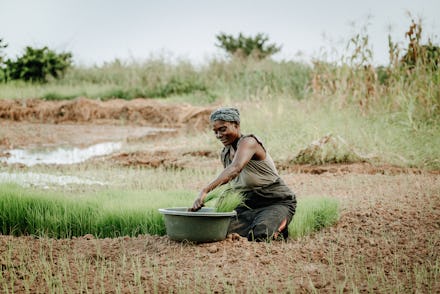Climate change is increasing gender-based violence, new study reports

Climate-related crises in poorer countries increases violence and exploitation of women, says a recent report, and current attempts to address climate change fail to tackle this issue. This was the conclusion reached by the International Union for the Conservation of Nature (IUCN), an international organization that promotes conservation and sustainability policies in government and corporate entities. The IUCN conducted what may be considered the largest and most thorough study on the subject, with research that lasted for two years and covered over 1,000 sources, according to The Guardian.
"We found gender-based violence to be pervasive," said Cate Owren, lead author of the report, to the publication, "and there is enough clear evidence to suggest that climate change is increasing gender-based violence."
The study found evidence that poorer countries struggle the most with handling events influenced by climate change — such as droughts, extreme natural disasters, and ecological changes that create food or water scarcity — and that the stress or struggle to manage these pressures can result in an increased rate of "gender-based violence."
For the purposes of the study, "gender-based violence" included "domestic violence, sexual assault and rape, forced prostitution, forced marriage and child marriage, as well as other forms of exploitation of women." These countries aren't typically the largest contributors of carbon emissions in the world, but they face a disproportionate amount of harm from the climate crisis. Global warming and the destruction of the environment can impact what were once abundant resources these communities depended on. This can make people desperate.
Climate change can increase the frequency of disasters or make them more destructive, which hurts a community's ability to bounce back. When this happens in a country where women already lack rights, the struggle to recover can lead to their exploitation. According to the study, nearly 12 million additional young girls are believed to be married off after natural disasters. And previous research by anti-slavery organizations have found that sex trafficking increases by 20-30 percent after a climate-related disaster.
Arifur Rahman, chief executive of Young Power in Social Action (YSPA), explained to The Guardian in 2013: "Without a doubt, each time [Bangladesh] battles through an environmental disaster, we see a subsequent rise in cases of slavery and human trafficking. It's often not until months later that we're able to find and rescue the victims, but when we do and we ask when they were abducted or lured into the trade, the date they tell us often coincides with the date of the natural disaster. In our minds, and in our personal experience on the ground, this means the link between climate change and slavery could not be more clear."
Other anti-slavery organizations have reported similar observations.
Illegal activities, such as poaching and illegal resource extraction, also increase after climate-related devastation. These illegal activities, Owren found, are closely linked with the exploitation of women and young girls. In one example, the study detailed instances of fishermen in eastern and southern Africa who wouldn't sell fish to women unless they paid with sex. Similar examples were found with illegal logging and charcoal industries in Congo as well as illegal mines in Colombia and Peru.
In communities where women and girls are responsible for collecting resources, like water and firewood, from areas where climate change has made them scarce, the failure to find any can expose them to violence. The report also noted multiple instances of gender-based violence against environmental activists that protest the degradation of their land. In these situations, opponents have used sexual violence to quiet the protesters, shame them within their community, and scare others from the cause.
Despite these actual instances of gender-based violence, little has been done to include the protection of women and children in climate-related policies.
"Gender-based violence is one of the most pervasive but least talked-about barriers that face us in conservation and climate work," Owern told The Guardian. "We need to take the blinders off, and pay this concerted attention."
The United Nations (UN) and countries such as the U.K. are slowly but surely considering women and children in their environmental policies after much criticism from activists. Without including women in climate issues, some argue, any policies might not be effective or comprehensive enough.
"We need to recognize the unequal effects of the climate crisis on women," agreed Mary Robinson, chair of The Elders, an organization of senior peace and human rights activists. However, Robinson added that lawmakers should also note "that women's participation brings with it creative and sustainable solutions to both the climate emergency and social injustices.
"Tackling climate change and environmental degradation without the full inclusion of women will not succeed: gender equality is a prerequisite to the collective effort needed to address the climate emergency."